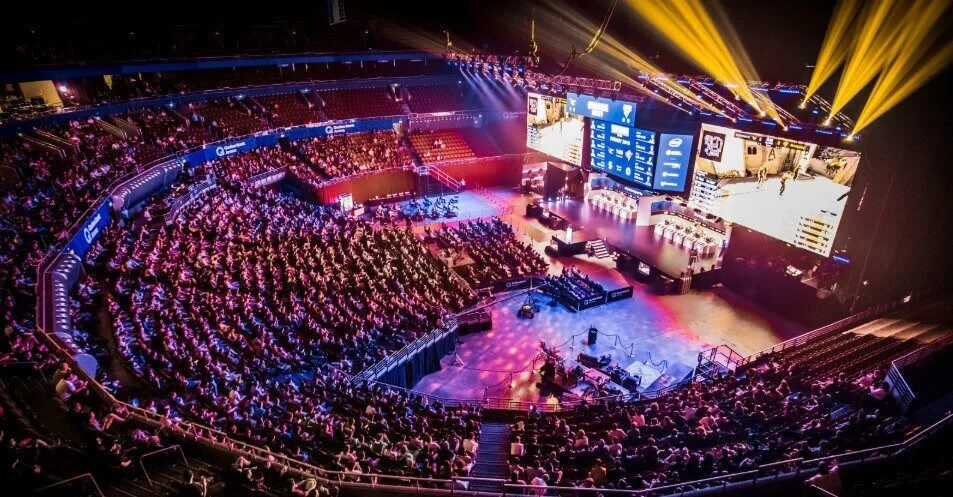Esports Arena has come quite a way from being a nebulous game for gamers to become an international phenomenon. Due to the increase in tournaments and gaming leagues that compete, the demand for specially designed venues has exploded. Enter the esports venue -an area in which virtual athletes compete, gamers meet, and gaming culture flourish. In this blog, we’ll discuss the different arenas for esports that are important to the gaming industry and what they can do to shape the future of competitive gaming.
What is an Esports Arena?
In essence, an esports venue is a space specifically designed to host Esports events and tournaments. Imagine it as a stadium for sports but with games on video. These arenas are constructed using the most advanced technology and infrastructure that supports the most advanced gaming setups, as well as live streaming and engaging fan experiences. From large-screen projections to ultra-high-performance gaming equipment, These arenas have been created to improve both the experience of fans and players.
Unlike traditional sports arenas, which allow athletes to play before a live crowd, Esports arenas are also equipped with the latest broadcasting technology. Fans from across the globe can experience a seamless event regardless of whether they’re watching from their homes or in the crowd. The venues usually have numerous gaming stations, huge LED screens that provide live event coverage, and areas specifically designed for audience interaction with sponsorship activations and merchandise sales.
The Evolution of Esports Arenas
Esports has been a part of the scene for a long time; however, it wasn’t until around the mid-2000s that tournaments with organized events began to gain some serious momentum. The first esports tournaments were usually held in temporary venues like conference rooms, internet cafes, or small auditoriums. As the industry expanded and grew, so did the demand for specific venues.
The first significant shift towards dedicated esports arenas was seen in Asia, with countries such as South Korea and China quickly becoming hot spots for gaming competition. In 2005, Korea’s Korean e-Sports Association opened the first esports arena in the world; it was the Yongsan e-Sports Arena in Seoul, which laid the foundation for the establishment of other arenas for esports around the world.
Today, we’re witnessing multi-million-dollar investment in arenas for esports across the globe. The growth of companies like Riot Games, Valve, and Blizzard Entertainment has resulted in the creation of venues that can host the most prestigious esports events, such as The League of Legends World Championship, The International Dota 2 Championship and Overwatch League Finals. Overwatch League Finals.
Technological Advancements in Esports Arenas
One of the most distinctive aspects of esports arenas is the use of cutting-edge technology. Professional gamers have access to the latest equipment, which is essential to succeed. Esports venues where players can play are provided with super-fast gaming machines with high-definition monitors and low-latency internet connections. This setup ensures that players are at their peak without being hampered by technical or lag problems.
Alongside gaming rigs, Esports arena are also known for their large LED screens and sophisticated audiovisual equipment. These configurations permit optimal live-streaming and broadcasting that allow viewers across the globe to watch and experience the event as if they were in the centre of the action. The high-end audio and visual effects add a new level of excitement, creating an experience that is truly immersive for both live viewers and online viewers.
The incorporation of technology in these arenas contributes to increasing fan engagement and interaction. With interactive touch screens and immersive experiences, as well as real-time player bios and statistics that are displayed on screens, Esports venues are evolving into high-tech centres for entertainment via digital technology. Virtual real-world (VR) and augmented reality (AR) in these arenas are exciting advancements that allow fans to enjoy games from different perspectives and connect with their team of choice.
More To Read: google update
Esports Arenas and the Global Gaming Culture
Esports is a global phenomenon which has fans and players from all over the globe gathering to celebrate gaming competitions. Esports arena are the physical manifestation of the digital world. They create an atmosphere of belonging between players, fans and professionals in the industry.
These venues are more than simply venues for games. They’re also a place for people who share a common interest to participate with each other in the excitement of the world of esports. It doesn’t matter if it’s watching the team of your choice, watching an on-air broadcast, taking part in a local competition, or people from all backgrounds and ages visiting esports venues to share their enthusiasm.
Furthermore, esports arena are now hot spots where people can interact and socialize. Fans are able to meet professional athletes, attend fan meet-and-greets, and interact with brands and sponsors in interactive venues. The sense of community led to esports moving from a niche sport into a popular form of entertainment.
The importance of esports to culture arenas goes beyond the realm of games of skill. They are host to events such as pop culture conventions, gaming festivals and fan-oriented exhibitions. As esports continues to merge with other entertainment fields, arenas for esports will have a greater influence on pop culture.
The Economic Impact of Esports Arenas
Esports venues aren’t only gaming hubs, but they also serve as major economic engines for their local economies. The hosting of large-scale events in esports could attract thousands of fans, creating revenues from ticket sales, tourism and merchandise. Cities that host renowned Esports events often experience an increase in tourist numbers as people flock to the arena to see what happens live.
The business aspect of arenas for esports is a multi-faceted ecosystem. Arena owners make money not just from ticket sales but also from partnerships, sponsorships, and broadcasting rights. Major brands like Intel, Coca-Cola, and Red Bull are already heavily involved in the esports world and have sponsorship agreements that offer significant financial assistance for teams and events.
Additionally, esports venues offer the opportunity for lucrative sales of merchandise on the internet and at physical events. From team jerseys to gaming accessories to exclusive limited edition collectables, the retail component of esports merchandise is flourishing. The growing demand for esports-related items creates a lively marketplace, and arenas are often used as hubs for transactions.
The growth of esports creates opportunities for job growth. From event managers and broadcasters to the security and staff of arena personnel, arenas for esports provide jobs in a variety of sectors. In addition, local businesses that surround the arenas, like hotels, restaurants and retail shops, profit from the large number of people who attend tournaments.
Future Trends: The Evolution of Esports Arenas
As esports continue to increase in popularity and popularity, the future of arenas for esports is extremely promising. The future arenas are likely to incorporate more immersive technologies, like virtual and Augmented Reality (VR/AR) and offer players new ways to enjoy their favourite games. It could be VR lounges that let fans “step inside” the game world or AR experiences that let attendees interact with characters and virtual environments at live events.
Sustainability is also an important factor in the coming years of arenas for esports. With the increase in the need for huge arenas that are energy-intensive, arena owners are looking for ways to make the places more sustainable. This could include green energy options, sustainable construction materials, and waste reduction programs to reduce any environmental impacts of big-scale events.
In addition, esports venues are becoming more adaptable. In the near future, they will be able to host a variety of events, such as concerts, corporate events, and film screenings. Due to the increasing interest in hybrid events, which allow both online and in-person fans to be involved in esports, arenas for esports will function as multi-purpose venues which go beyond tournaments for gaming.
Conclusion
Esports arenas offer more than just venues to play competitive games. They are vibrant hubs where technology, as well as culture and business, meet to create an unforgettable experience for players and fans. With their top-of-the-line infrastructure, the latest technology, and a growing influence from culture, Esports arenas are defining the future of entertainment and gaming.
As esports evolve and evolve, so will the venues hosting these events. The merging of gaming, live events, interaction with fans, and technological innovation will further redefine what is considered to be a part of the world of esports. The future of esports is bright for arenas. And as the sport continues to grow and grow, these venues will surely play an important role in pushing the limits of what is possible in the realm of competitive gaming.



